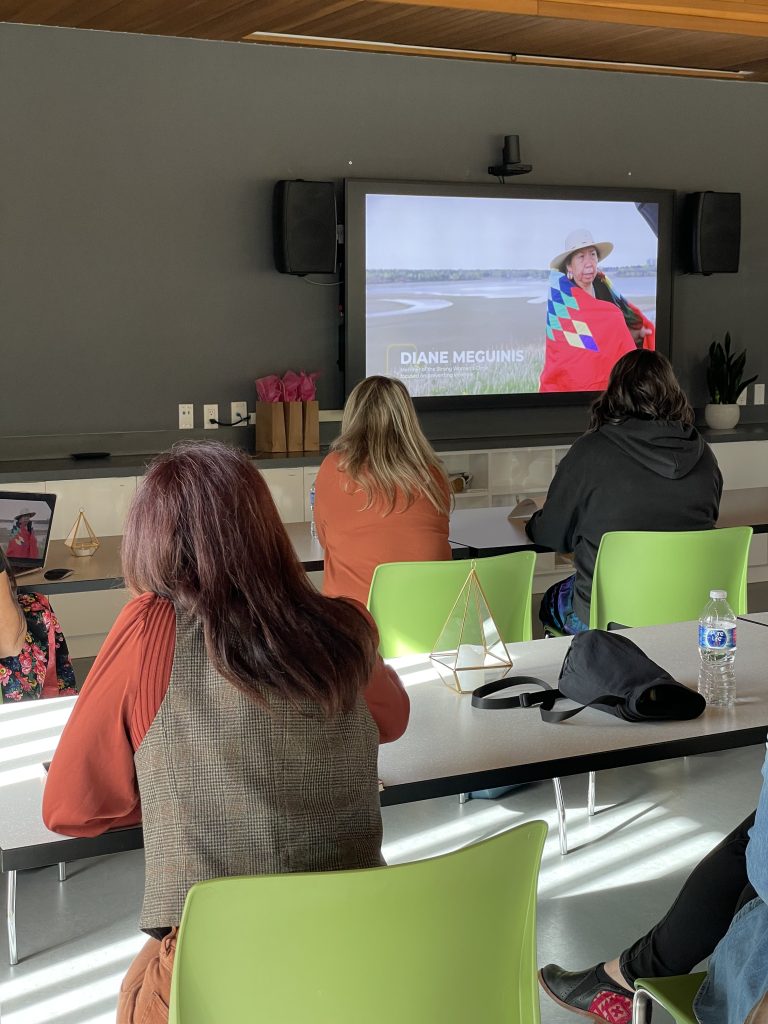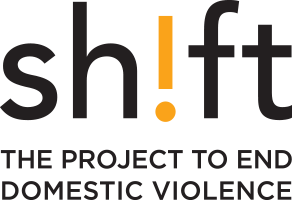Date: October 2024
Collaborators: Ireland, L. & Reimer, K; Urban Society for Aboriginal Youth
Director, Executive Producer, and Writer: Wells, L.
Assistant Producers and Video Production: Williamson, W. & Martin, K., Studio Lumen
Editor: Zacharias, C.

Shift is working with Elders, Knowledge-Keepers, and Grandmothers to better understand primary prevention solutions that can address the root causes of family violence in Indigenous communities. Our Strong Women’s Circle research initiative has produced reports, policy briefs, and an initial film that each articulate the transformative changes and policy reforms needed to achieve Indigenous sovereignty and prevent violence.
This week, we joined our partner, the Urban Society for Aboriginal Youth at the Inglewood Bird Sanctuary for the release of a second film as part of the Strong Women’s Circle research initiative: “Strong Women’s Circle: Achieving Sovereignty in Our Children’s Welfare”.
This film is a call to change: we need to decolonize the child welfare system in Alberta.
When Indigenous children are apprehended by child welfare services, they suffer severe mental stress, the loss of their traditional culture and community, and are often exposed to neglect and violence. This increases the likelihood of further abuse or perpetration of family, domestic, and sexual violence.
With insights from Valerie Wood, Karen Acuna, and Diane Meguinis, “Strong Women’s Circle Achieving Sovereignty in Our Children’s Welfare” outlines the context needed to understand why Indigenous service sovereignty matters, the problems with Alberta’s current child welfare system, the importance of thoughtful social work, and the possibilities for reimagining a new approach.
Watch the film here.
Key Quotes
- “We operate in a collective. So when a child is taken, that child isn’t taken from this little nuclear family… yet nowhere on the reporting or documentation or assessment, nowhere does it say [that] all of these people are part of making sure this child is safe… [The] hope and dream is that if they are trying to make an assessment of if that child is in need of protective services, [they will] ask the question: who is this child’s collective?” – Valerie Wood, collaborator
- “The power, the resources need to be given back to each nation… to be able to get at the root problem, we actually need to be able to deconstruct that and start making up systems that are favourable for Indigenous peoples, and letting the people of the nations build the new system. Because that’s where the solution is, and I believe change is possible.” – Karen Acuna, collaborator
- “This next film is focused on decolonizing the child welfare system, specifically because of the frequent removal of Indigenous children from their families and communities, and to address the overrepresentation of Indigenous children in our child welfare system, which leads to intergenerational family violence” – Lana Wells, director, producer, and writer & Brenda Strafford Chair in the Prevention of Domestic Violence
Quick Facts
- In 2020, Bill C-92 became law in Canada/Turtle Island, formally affirming the jurisdiction of all Indigenous Peoples – including First Nations, Inuit, and Metis communities – over child and family services to develop policies and laws based on their particular histories, cultures, and circumstances; ¹
- In 2024, the Supreme Court of Canada unanimously upheld the jurisdiction of Indigenous peoples over child welfare, affirming that First Nations, Inuit and Métis communities have the right to lead their own child and family services; ²
- 74% of the 9,363 children in Alberta today receiving child intervention services are Indigenous, despite Indigenous people only comprising 10% of the youth population; ³
- As of 2019, compared to non-Indigenous children, First Nations children of all ages were more likely to be under child welfare investigations and to have increased service involvement. ⁴
Associated Resources
- Shift’s work with Indigenous communities
- Report: Strong Women’s Circle – Supporting Alberta Primary Prevention Framework by Mapping Root Causes of Violence and Identifying Policy Recommendations to Stop Violence Against Indigenous Peoples Before It Starts
- Film 1: Strong Women’s Circle – A Systems Change Approach to Addressing Family Violence Within Communities
- Urban Society for Aboriginal Youth Website
- Studio Lumen Website
References
1 Government of Canada. “An Act Respecting First Nations, Inuit and Métis Children, Youth and Families Receives Royal Assent.” Indigenous Services Canada, 21 June 2019, www.canada.ca/en/indigenous-services-canada/news/2019/06/an-act-respecting-first-nations-inuit-and-metis-children-youth-and-families-receives-royal-assent.html
2 Government of Canada, Department of Justice. “The Court Cites the UN and Family Services is Constitutional.” Justice Canada, www.justice.gc.ca/eng/declaration/stories-histoires/01.html#:~:text=The%20court%20cites%20the%20UN,and%20family%20services%20is%20constitutional.
3 Government of Alberta. Child Intervention Information and Statistics Summary 2022-2023 Q4. Open Alberta, https://open.alberta.ca/dataset/de167286-500d-4cf8-bf01-0d08224eeadc/resource/1fb466ae-1e6b-49e4-8909-10beea550e6d/download/cs-child-intervention-information-and-statistics-summary-2022-2023-q4.pdf
4 Métis Women of Canada. MMIWG Report. Les Femmes Michif Otipemisiwak, June 2021, https://metiswomen.org/wp-content/uploads/2021/06/LFMO-MMIWG-Report.pdf


